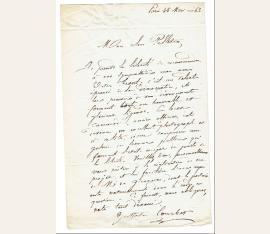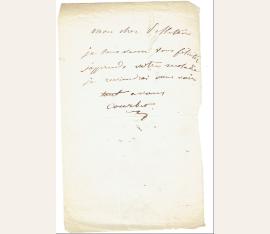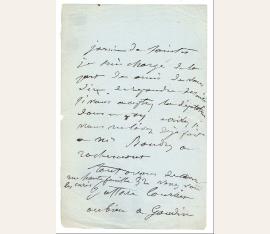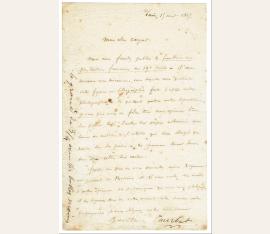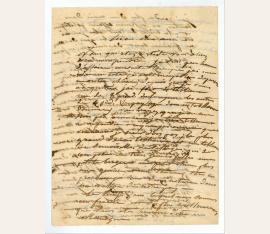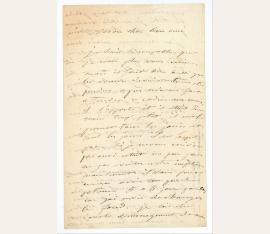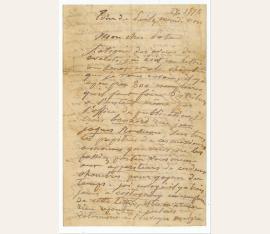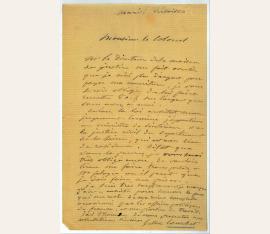Maler (1819-1877). Brief mit eigenh. Unterschrift „Gustave Courbet“. Paris. 8vo. 1 p. auf Doppelblatt mit eigenh. Adresse von E. Pelletan.
3.500 €
(80468)
An Eugène Pelletan (1813-1884) „Je prends la liberté de recommander à vos sympathies mon ami Victor Front; c’est un soldat éprouvé de la démocratie, et les preuves de son dévouement forment toute une honorable et glorieuse légende. Le brave camarade, ancien officier, est devenu un excellent photographe et à ce titre, désire compser une galerie des hommes publics qui forment l’état-major du parti de la liberté. Veullez donc, personnellement vous prêter à la réalisation de son projet, et lui faciliter l’accès auprès de M.
de Girardin.“ (Übersetzung: „Nehme ich mir die Freiheit, meinen Freund Victor Front Ihren Sympathien zu empfehlen. Er ist ein bewährter Soldat der Demokratie, und die Beweise seines Engagements bilden eine ehrenwerte und ruhmreiche Legende. Der tapfere Kamerad, ein ehemaliger Offizier, ist zu einem hervorragenden Fotografen geworden und möchte als solcher eine Galerie von öffentlichen Männern zusammenstellen, die den Stab der Freiheitspartei bilden. Bitte eignen Sie sich persönlich für die Realisierung seines Projekts und erleichtern Sie ihm den Zugang zu Herrn de Girardin.[...] Gustave Courbet“) Gustav Courbet gehört zu den bedeutenden Malern des französischen Realismus, den er gemensam mit anderen Künstlern und Intellektuellen wie Charles Baudelaire, Pierre-Joseph Proudhon und Max Buchon, mit dem er bereits seit der Kindheit befreundet war, entwickelt hatte. Courbet entwickelte sich zum Hauptvertreter der realistischen Malerei in Frankreich und hatte damit einen weitgehenden Einfluss auf die Entwicklung der nachfolgenden Malerei, besonders auf die realistischen Maler in Deutschland. Aber er begründete in dieser Zeit auch seinen Ruf als avantgardistischer Maler. Eugène Pelletan war ein französischer Schriftsteller, Publizist und gehörte seit 1863 als Abgeordneter der Volksvertretung im zweiten Kaiserreich an..
Maler (1819-1877). Eigenh. Brief mit U. „Courbet“ o. O. o. D. 8vo. 1/2 p.
2.500 €
(80469)
An Eugène Pelletan (1813-1884) „Mon cher Pelletan. Je suis venu vous féliciter. J’apprends votre maladie, je reviendrai vous voir. Tout á vous Courbet.“ (Übersetzung: „ Ich bin gekommen, um Ihnen zu gratulieren. Jetzt erfahre ich, dass Sie krank sind. Ich komme zurück und besuche Sie. Ganz Ihr Courbet“) Gustav Courbet gehört zu den bedeutenden Malern des französischen Realismus, den er gemensam mit anderen Künstlern und Intellektuellen wie Charles Baudelaire, Pierre-Joseph Proudhon und Max Buchon, mit dem er bereits seit der Kindheit befreundet war, entwickelt hatte.
Courbet entwickelte sich zum Hauptvertreter der realistischen Malerei in Frankreich und hatte damit einen weitgehenden Einfluss auf die Entwicklung der nachfolgenden Malerei, besonders auf die realistischen Maler in Deutschland. Aber er begründete in dieser Zeit auch seinen Ruf als avantgardistischer Maler. Eugène Pelletan war ein französischer Schriftsteller, Publizist und gehörte seit 1863 als Abgeordneter der Volksvertretung im zweiten Kaiserreich an..
Maler (1819-1877). Eigenh. Brief mit U. „Gustave Courbet“ o.O.o.D. 8vo. 1/2 p.
4.500 €
(80470)
An einen ungenannten Adressaten: „Je suis chargé de la part des amis de vous dire de repondre de suite. Si vous acceptez la députation dans ce pays ecrivez si vous ne l’avez déjà fait [...]“ (Übersetzung: „Ich werde im Namen der Freunde angewiesen, Ihnen zu sagen, dass Sie sofort antworten sollen. Wenn Sie die Deputation in diesem Land akzeptieren, schreiben Sie, falls Sie dies noch nicht getan haben. [...]“) Gustav Courbet gehört zu den bedeutenden Malern des französischen Realismus, den er gemensam mit anderen Künstlern und Intellektuellen wie Charles Baudelaire, Pierre-Joseph Proudhon und Max Buchon, mit dem er bereits seit der Kindheit befreundet war, entwickelt hatte.
Courbet entwickelte sich zum Hauptvertreter der realistischen Malerei in Frankreich und hatte damit einen weitgehenden Einfluss auf die Entwicklung der nachfolgenden Malerei, besonders auf die realistischen Maler in Deutschland. Aber er begründete in dieser Zeit auch seinen Ruf als avantgardistischer Maler..
französischer Maler (1819-1877). Eigenhändiger Brief mit Unterschrift. Paris. 8vo. 1 p. Fleckig. Doppelblatt.
2.500 €
(83271)
An den Fotografen und Karikaturisten Étienne Carjat (1828-1906): „Mon cher Carjat“. Courbet berichtet, sein Freund (Victor) Fronds wolle ein Porträt in Lithographie von Courbet in seine Publikation „Panthéon des illustrations françaises au XIXe siècle“aufnehmen; Courbet wünscht sich „votre photographie“ als Vorlage. Die Lithographie Courbets wurde schließlich nach einer Vorlage von Pierre Petit geschaffen.
French painter (1819-1877). Autograph letter signed. No place. 4to. 4 pp. on bifolium.
9.500 €
(82546/BN53717)
To a "cher ami", concerning his 1848 exhibition at the Salon in Paris, where he exhibited ten of his works: "[...] depuis que je vous ai quitté j'ai fait 4 tableaux un de 8 pieds de longueur les autres de 4 pieds. L'exposition va s'ouvrir dans un mois il faut que dans 15 jours j'envoie mes tableaux nouveaux [...]". Courbet, who was involved in the events of the February Revolution, did not believe his work would be popular: "L'exposition qui va s'ouvrir me sera très peu favorable comme vous pouvez le penser, en France a tort ou à raison on me nomme le peintre socialiste [...]".
In fact, the exhibition turned out to be a great success for Courbet, and the following year he received the gold medal for his painting "After Dinner at Ornans". - In excellent condition..
French painter (1819-1877). Autograph letter signed. No place. 8vo. 2 pp. on bifolium.
5.500 €
(82547/BN53718)
To a "cher bon ami", concerning an upcoming exhibition. Courbet is outraged, having waited for months for frames: "les doreurs devraient être tous pendus" ("hang the gilders!"). Nor is he pleased with his financial situation: "je ne suis vraiment pas né pour les affaires". - In good condition.
French painter (1819-1877). Autograph letter signed. La Tour-de-Peilz (Canton of Vaud). 28.03.1876. 8vo. 4 pp. on bifolium.
14.500 €
(82591/BN53773)
Important, unpublished letter (in French) to his last assistant and confidant Cherubino Patà (1827-99) concerning a petition to the members of the two chambers of the French Parliament and Courbet's bitter conflict with his brother-in-law, the painter Jean-Baptiste Reverdy. Courbet had been living in Swiss exile since 1873, following his role in the destruction of the Colonne Vendôme during the Paris Commune, 6 months in prison, and an unpayable fine amounting to the costs of the monument's restoration, which was carried out in 1875.
Disappointed by his lawyers, Courbet decided to petition for amnesty and asked Patà to deliver 800 copies to a Mr Bonnard at the "publication office", who was responsible for sending the letters to all parlamentarians and several French newspapers. To finance this campaign, Courbet asks Patà to sell a winter landscape painting, possibly "Effet de Neige" (1866-68), for 500 francs through Patà's wife. He emphasizes that it is "impossible to live in a situation similar to mine for three years, even longer", that he counts on Patà "in an absolute way because it [his situation] is extremely grave", and thanks his friend wholeheartedly: "I thank you very much for all the troubles you went through for me and for my interests [...]". The liberal politician and pioneering art critic Jules-Antoine Castagnary, who was an intimate friend and close ally of Courbet, is mentioned as having received the letter for corrections, but Courbet was too impatient to wait for his response, instructing Patà to visit Castagnary personally instead. Victor Hugo, another friend and ally of the painter, is mentioned as having prematurely pushed for an earlier amnesty vote for the Communards, possibly the one in 1874, that in Courbet's eyes was doomed to fail: "As I have already told you, I was sure that the amnesty would not be voted through, Victor Hugo went for it too early". However, Courbet's effort was equally fruitless, and he died in exile of a liver disease on 31 December 1877, days before the first instalment of his fine was due. - The painter Jean-Baptiste Reverdy was the husband of Gustave Courbet's eldest sister Zoé. He was involved in the sale of Courbet's paintings but the two men eventually fell out. Courbet details Reverdy's method to smuggle paintings to France in moving vans and mentions that he stores them at the mill of a Mr Jars, Courbet's "regular receiver". Angrily, he calls Reverdy a "mackerel" (French slang for a pimp), announcing, "we have to hope that we will go to Ornans to cut his throat and take what's left from his thefts", but also joking about not recognizing one of Reverdy's landscape paintings hanging next to one of his own when Cézanne's muse (and later wife) Marie-Hortense Fiquet paid him a visit: "I was an idiot such as one should not be when Miss Fiquet presented herself at my place. Imagine that my landscape was accompanied by a landscape in upright format by Mr Reverdy that I did not recognize initially and it is he who had sent it to me". - In closing, Courbet emphasizes the importance of the circular once more, adding that "it is better than Mr Lachaud and Mr Duval", his lawyer and his physician. - Traces of folds. With some minor tears and minimal foxing..
French painter (1819-1877). Autograph letter signed. Versailles. 8vo. 1 page.
12.000 €
(86153/BN57105)
Letter written from the Versailles House of Justice to a colonel, possibly Louis-Dieudonné Gaillard, after Courbet's indictment for the destruction of the Vendome column. He mentions that the prison director has warned him that his resources to pay for his food are exhausted, requests a transfer of 50 francs, points out that he will belong to the Minister of the Interior and the civil justice of the Département de la Seine as soon as his trial is over, and hopes to be transferred to Sainte-Pélagie soon, as he is suffering from lack of air: "Mr le Directeur de la maison de justice me fait avertir que je n'ai plus d'argent pour payer ma nourriture, je vous serais obligé de lui faire remettre 50 f.
sur l'argent que vous avez à moi. Selon la loi aussitôt mon jugement terminé j'appartiens au ministre de l'Intérieur et à la justice civile du département de la Seine, qui est mon lieu de résidence. Sitôt que vous le pourrez, je vous serai très obligé encore de vouloir bien me faire transporter à Ste Pélagie où il paraît que je dois faire ma prison. Je suis très souffrant et je manque d'air - ensuite pour sauver le peu qui me reste de ma ruine complette occasionnée par les affaires politiques de France, et ma privation de travail [...]". Courbet was transferred from the Orangerie to the Versailles House of Justice before being taken to Sainte-Pélagie. - Small flaw to lower left corner..
